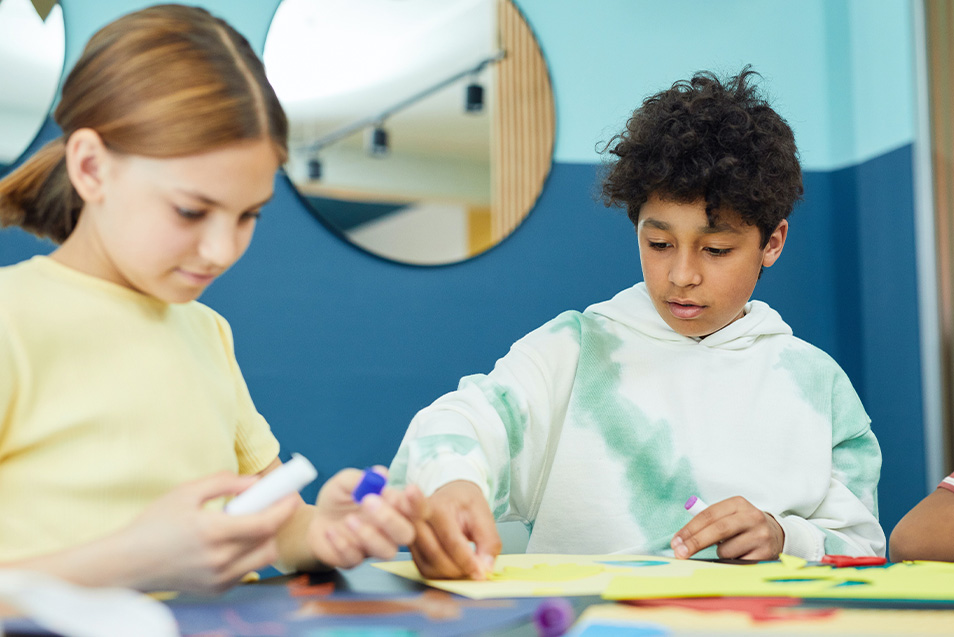The YMCA of Greater Kansas City (the Y) has been part of the area’s charitable landscape since 1860. Like the Children’s Services Fund, the Y works to strengthen communities. The local chapter’s three focus areas are youth development, healthy living and social responsibility.
“We want to be inclusive to all and support the well-being of everyone,” said Patty Lucas, the Y’s Vice President of Head Start, of their overall mission. The Y’s emphasis on quality youth programming is the foundation for a thriving Kansas City. Safe and supported kids with plenty of mental health resources grow into healthy adults who can give back to the next generation.
The CSF supports two of the Y’s core youth development programs, which provide prevention services, one of the CSF’s service areas:
Head Start
The Y runs federally funded Head Start programs that help children with diagnosed disabilities and children from low-income families prepare for elementary education. “We look at the whole child and the whole family to see how we can get them all ready to go to school,” said Patty. The programs serve both preschoolers, ages 3 to 5, and toddlers, ages 6 weeks to 3 years (Early Head Start).
Before- and After-School Youth Programs
CSF helps fund the Y’s school-based behavioral health expansion project, which serves around 1,400 Jackson County students. The programs take place before and after school at 18 sites in Lee’s Summit (K-5th grade) and at Crossroads Academy in downtown Kansas City (ages 5 to 12). The programs build community, encourage youth leadership, support academic achievement, and develop social and emotional skills.
Head Start: Building resilience, one child at a time
For the Y’s Head Start program, the CSF funds two behavioral specialist positions and a coordinator position that manages mental health and behavior needs at the program’s five locations.
“What that allows us to do within Head Start is provide more early intervention — and long-lasting intervention — in regards to mental health,” explained Genevieve Muncy, the Y’s Head Start Mental Health Coordinator.
Genevieve uses the Devereux Early Childhood Assessment (DECA) tool to evaluate how Head Start kids’ social and emotional skills are progressing. The tool measures resilience through three strengths: developing healthy relationships, learning to regulate emotions, and showing initiative. When a child needs help growing in any of these areas, Genevieve creates a success plan for them. But before CSF funding, carrying out those plans consistently was difficult.
“There wasn’t anyone to help with the modeling, follow-through and day-to-day work that those plans entail,” Genevieve said. Coordinators would hand the plans over to Head Start educators and check in as much as they could, but the Y didn’t have the headcount for more in-depth one-on-one work. “Now, with the funds, we have two behavioral specialists who are able to follow those plans through.”
For example, if a success plan calls for using connection rituals to help a child build healthy attachments, the behavioral specialists model those rituals for the teachers, help the teachers consistently practice them, and work on them with the child as well.
“Our behavioral specialists are able to do them week after week with that child, so that they have more adults who are promoting and modeling that care,” Genevieve explained.
Youth Programs: Trauma-informed support for COVID-era growth
CSF has helped the Y’s youth programs bolster their social and emotional well-being resources for participating kids. With funds from CSF, the Y has been able to bring a variety of mental health supports and tools into their before- and after-school programs, including:
- A behavioral staff team
- A behavior coach
- Trauma Smart staff and parent training
- Crisis Prevention Institute (CPI) training
“The lens that we put on at both our youth programs and at Head Start is shifting from ‘What is wrong with that child?’ to ‘What happened to that child?’ “ said Caitlyn White, the Y’s Behavior Specialist for Youth. “We also keep in mind that all behavior is a form of communication. What are they communicating to us right now, and how do we meet that need?”
Caitlyn says the Y’s goal is to help build resilience in both children and their families, so they can handle difficult and even traumatic situations. The pandemic era added another layer of trauma on top of adverse experiences many children already face.
“We have a significant amount of increased behavior in this post- and ongoing-COVID world that we are working to support daily,” explained Caitlyn. Most school-aged children were out of school during the early pandemic. They had increased screen-time, decreased supervision and much less peer engagement. Their families may have been facing food insecurity, homelessness, and more.
“These kids need connection so badly after COVID,” Caitlyn said. “They really need those adults in their lives that are going to be there to support them and help them work through it and learn new things.”
Through well-trained and resourced behavioral staff members, CSF is helping give students at the Y’s school-based programs the social-emotional skills to cope — and overcome.
“From the data collection to how responsive CSF has been, it’s been a great partnership,” Genevieve said. “They’ve been super appreciative of the work that we’re doing. It’s heart work, but hard work. They’ve always been along with us on that journey and really believe in the missions we have for children’s resilience.”
Want to know more about how CSF and our funded partners are supporting Jackson County’s kids?
SIGN UP for our monthly newsletter!

